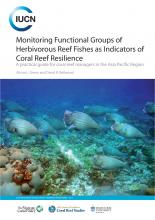Monitoring functional groups of herbivorous reef fishes as indicators of coral reef resilience : practical guide for coral reef managers in the Asia Pacific Region


Climate Change Resilience, Biodiversity Conservation
Available Online
Bellwood David R
,
Green Alison L
2009
Coral reefs are the most structurally complex and taxonomically diverse marine ecosystems on earth, providing ecosystem goods and services for millions of people worldwide. These reefs are seriously threatened by a variety of anthropogenic threats, particularly overexploitation of marine resources, destructive fishing practices and runoff from poor land use practices. Over half of the world's reefs have already been lost or are under threat from these activities, with serious and widespread declines in reef health reported from around the world. Climate change also represents a new and increasing threat to coral reefs and associated ecosystems. Major threats include rising sea temperatures, rising sea levels and changes in ocean chemistry. Urgent action is now required to halt or reverse these threats and declines in coral reef health. One approach to the protection of reefs during this period of change is to manage for resilience.
